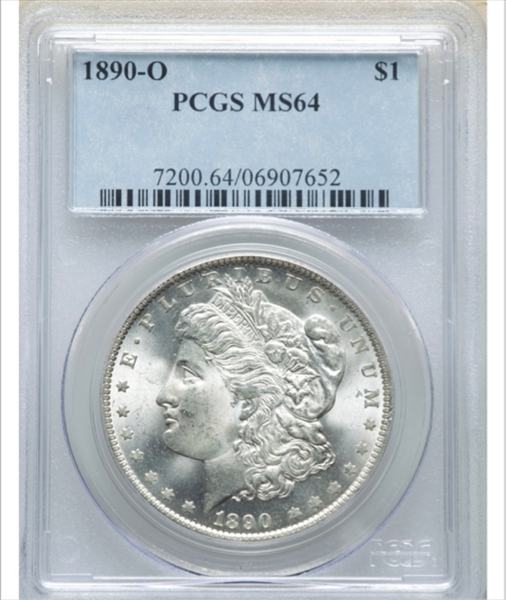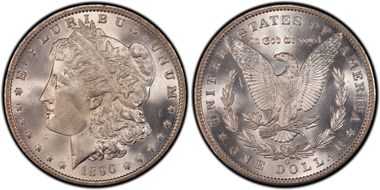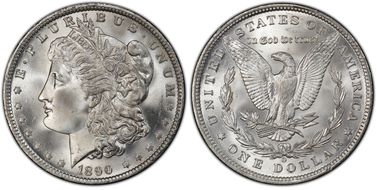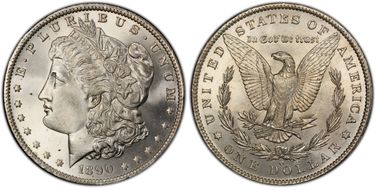1890-O $1 MS64 认证号06907652, PCGS号7200
专家评论
Q. David Bowers
The following narrative, with minor editing, is from my "Silver Dollars & Trade Dollars of the United States: A Complete Encyclopedia" (Wolfeboro, NH: Bowers and Merena Galleries, Inc., 1993)Numismatic Information
Hoard coins: Probably at least 500,000 of these, if not far more, were held by the Treasury (and stored in Philadelphia) until the 1960s, and released during the 1962-1964 era. Earlier, 1890-O dollars had been paid out over a long period of decades, with an especially large release occurring in 1953-1954, with the result that 1890-O dollars in Mint State have been neither rare nor expensive.
Circulated grades: In worn grades the 1890-O is one of the most common of all Morgan dollars. Over a million exist, and this is after large quantities were melted as recently as the late 1970s.
Mint State grades: As a class, Mint State 1890-O dollars are common. However, most of these are in lower grade levels, with an estimated 60,000 to 100,000 at the MS-60 to 62 demarcation. MS-63 coins are also relatively easy to find, with a population of 40,000 to 70,000. In MS-64 grade the 1890-O becomes scarce; about 10,000 to 18,000 exist. Full MS-65 coins are quite scarce, especially if sharply struck, and I believe that if each and every one could be counted, the total would be only 1,000 to 2,000.
Most Mint State coins are weakly struck, although there are some exceptions. Numerous poorly struck coins show microscopic "ridging" or "metal flow" in the fields, particularly near the borders. The lustre on other coins is usually frosty and attractive. Concerning striking quality, Wayne Miller wrote: "This date is a close runner-up to 1891-O in the contest for the 'Pancake of the Morgan series' title."
Prooflike coins: Prooflike coins are relatively plentiful and usually are better struck than non-prooflike pieces, although flatly struck prooflike coins are also easy to find. Wayne Miller noted that 1890-O is available in cameo prooflike condition with frosty devices-often with heavy bagmarks. However, deep prooflike pieces with minimum abrasions are often found and are somewhat overrated (as of Miller's commentary in 1982), but look very attractive. Only about 3% of extant DMPL coins are MS-65 or finer. The "Proof' offered by B.M. Douglas in The Numismatist, 12/51, was probably a DMPL. On the other hand, that in the "Anderson Dupont" sale (Stack's, Nov. 12-13, 1954), at a then high $25, may have been something better. It has not been traced.
Die rotation: VAM-2 is known with the reverse die misaligned 20° to 60° clockwise from normal. This anomaly is known in Mint State. VAM-8 exists with the reverse die rotated 36° counterclockwise from normal. Only circulated specimens have been seen by Van Allen and Mallis.
Varieties
Circulation strikes:
1. Even Date: Breen-5613, high zero, Breen-5614, VAM-7 and others. R.W. Julian says that 41 reverses were shipped; no data on when these arrived. The mintage probably required at least 40 die-pairs.
Dies prepared: Obverse: Unknown, probably about 40; Reverse: 41.
Circulation strike mintage: 10,701,000 (8,721,000 un-der the Act of February 28, 1878 and 1,980,000 under the Sherman Silver Purchase Act); Delivery figures by month: January: 1,000,000; February: 1,000,000; March: 1,000,000; April: 1,000,000; May: 750,000; June: 700,000; July: 700,000; Au-gust:' 460,000 + 280,000; September: 150,000 + 700,000; October: 500,000 + 500,000; November: 500,000 +500,000; December: 961,000.
Estimated quantity melted: Probably millions under the 1918 Pittman Act.
Availability of prooflike coins: Such issues, many of which are DMPL, are estimated to exist to the extent of 25,000-50,000 (URS-16). Only about 3% of the extant DMPL coins are MS-65 or better.
Characteristics of striking: Usually seen flatly struck, but there are exceptions.
Known hoards of Mint State coins: Many bags were released by the Treasury over a period of years, especially 1962-1964
Commentary
The 1890-O is very common in lower Mint State levels but is very elusive MS-65, sharply struck.
Additional Information
Silver Dollar Distribution
The Annual Report of the Director of the Mint, 1890, gave the following information concerning distribution of silver dollars in the fiscal year ending June 30, 1890 in the New Orleans Mint: July 1, 1889, 5,090,418, coined during the fiscal year 12.3 million, total available for distribution 16,015,418.In the Carson City Mint June 30, 1890, 8,459,974, distributed 7,555,444.
Storing Silver Dollars in 1890
The Annual Report of the Director of the Mint, 1890, told of the condition of the New Orleans Mint:
"The mint at New Orleans works to some disadvantage as compared with the other coinage mints for the reason that the machinery is of very old style and pattern, and much of the apparatus is worn out or no longer fit for use; at least is very unreliable. In the coiner's department the machinery is run by a system of cog and miter wheels which impart a vibratory motion to the rolls.
A new burglar-proof steel vault, with a capacity of 5,286 cubic feet, is in process of erection in connection with the mint at New Orleans. Owing to the peculiar condition of the foundation of the mint at New Orleans considerable preparatory work was necessary, consisting of removing stairs and second-story floor in west wing, bricking up openings of doors and windows, piling for foundation, brick work, concreting, etc. This preparatory work is nearly completed. Cost of preparatory work $4,782.00. Superintendent's commission of 5% $239.10. Total $5,021.10.
"The vault is to be steel-lined, 31 feet 11-1/2 inches long, 23 feet 5-1/2 inches wide, 11 feet 6-1/2 inches high, divided into six iron lattice compartments, with lattice door to each, a 4 foot 6 inch wide corridor through center, and a narrow walk, 2 feet wide, all around. Four of the compartments, 6 feet 2 inches by 11 feet 10-3/4 inches by 11 feet 6-1/2 inches. Two of the compartments, 6 feet 11 inches by 11 feet 10-3/4 inches by 11 feet 6-1/2 inches. Cubic contents of compartments, 5,286 cubic feet. The storage capacity for silver dollars will be: In boxes ($1,000 each) $15 million. In bags ($1,000 each) $22 million."
PCGS #
7200
设计师
George T. Morgan
边缘
Reeded
直径
38.10 毫米
重量
26.73 克
铸币数量
10701000
金属成分
90% Silver, 10% Copper
更高评级数量
1393
评级较低的钱币数量
10271
地区
The United States of America
价格指南
PCGS 数量报告
拍卖 - PCGS 评级的
拍卖 - NGC 评级的
稀有性和存量估计 了解更多
| 所有评级 | 1000000 |
| 60或以上 | 160000 |
| 65或以上 | 1700 |
| 所有评级 | R-1.1 |
| 60或以上 | R-1.9 |
| 65或以上 | R-4.7 |
| 所有评级 | 87 / 117 TIE |
| 60或以上 | 75 / 117 TIE |
| 65或以上 | 55 / 117 TIE |
| 所有评级 | 87 / 117 TIE |
| 60或以上 | 75 / 117 TIE |
| 65或以上 | 55 / 117 TIE |
























